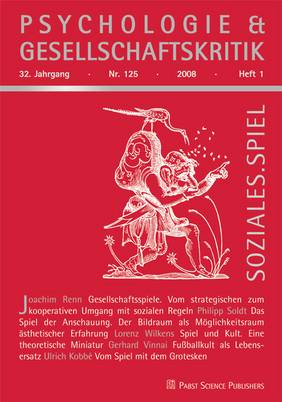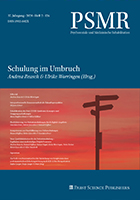Editorial
Joachim Renn
Gesellschaftsspiele. Vom strategischen zum kooperativen Umgang mit sozialen Regeln
Zusammenfassung | Abstract
Philipp Soldt
Das Spiel der Anschauung. Der Bildraum als Möglichkeitsraum ästhetischer Erfahrung
Zusammenfassung | Abstract
Lorenz Wilkens
Spiel und Kult. Eine theoretische Miniatur
Zusammenfassung | Abstract
Gerhard Vinnai
Fußballkult als Lebensersatz
Zusammenfassung | Abstract
Ulrich Kobbé
Vom Spiel mit dem Grotesken
Zusammenfassung | Abstract
Mitteilungen
Memorandum für eine fundierte Methodenausbildung in den Human- und Sozialwissenschaften
Gesellschaftsspiele. Vom strategischen zum kooperativen Umgang mit sozialen Regeln
Joachim Renn
Am Beispiel unterschiedlicher sozialer Spiele wird gezeigt, dass die - in der Psychologie und Soziologie des Spiels allzu übliche - antagonistische Priorisierung entweder von Konkurrenz oder von Kooperation abstrakt und der Binnenstruktur sozialer Spielformen nicht angemessen ist, vor allem weil die Regeln, die für diese Spiele konstitutiv sind, während des Spiels performativ modifiziert und ausgehandelt werden. Spieltheorien, die entweder den egoistischen homo oeconomicus oder aber die intersubjektive Solidarität privilegieren, sind beide unvollständig, sofern sie die Bedeutung der zugleich agonalen wie kooperativen Steigerung der Qualität des Spielens, d. h. des Kriteriums eines guten Spiels verfehlen. Anhand unterschiedlicher metaphorischer Verwendungen des Spielbegriffs (bei Mead, Huizinga, Piaget, Wittgenstein) werden die Beziehung zwischen Ernst und Spiel und andere relevante Unterscheidungen entwickelt. Das Verhältnis zwischen Kooperation und Konkurrenz wird am Beispiel des Schachspiels, in Anwendung auf die Spiele des Marktes, der Wissenschaft und der Politik untersucht, um zu zeigen, dass Spielregeln und Spielzüge weder in der Wirtschaft noch in der Wissenschaft - entgegen verbreiteter Annahmen - primär durch Konkurrenz oder Kooperation bestimmt werden, sondern Momente einer komplexeren Praxis darstellen.
Schlüsselbegriffe: Schachspiel, Spiele, Regeln, Konkurrenz, Kooperation
Gesellschaftsspiele. From the strategic to the cooperative dealing with rules
Referring to different versions of social games the author argues that the common and antagonistical priorisation of either competition or cooperation is too abstract and does not meet the internal structure of social games. This is especially due to the fact that the rules for these games are constitutive rules which are modified and negotiated performatively during the game. Game theories which privilege either the ego-driven homo oeconomicus or inter-subjective solidarity are both incomplete: the fail to grasp the increase in quality of the game during performance and thus the criterion for a good game. In the second part of the paper the relation between seriousness and game and other differentiations are developed drawing from different metaphoric uses of game (Mead, Huizinga, Piaget, Wittgenstein). The relation between cooperation and competition is explained with reference to the game of chess, the games of the market, of science and of politics. It is shown that rules and moves in games are not determined by either cooperation or competition, but are subject to a complex practice.
Key words: Chess, games, rules, competition, cooperation
Joachim Renn
FAU Erlangen-Nürnberg
Philosophische Fakultät und FB Theologie
Institut für Soziologie
Kochstrasse 4,
91054 Erlangen
E-Mail: jmrenn@phil.uni-erlangen.de
Das Spiel der Anschauung. Der Bildraum als Möglichkeitsraum ästhetischer Erfahrung
Philipp Soldt
Das Konzept des Spiels hat den Stellenwert eines ästhetischen Grundbegriffs. Als solcher kann Spiel die spezifische Qualität ästhetischer Erfahrungen aufklären und ist gleichzeitig ein zentraler Bestandteil psychoanalytischer Entwicklungstheorie. Anhand der Theorien Freuds, Winnicotts und Ogdens und vor allem im Bezug auf die Konzepte des Möglichkeits- und Übergangsraums wird versucht, den Zusammenhang zwischen spielerischem Verhalten, der Erzeugung von Subjektivität und kreativ-ästhetischen Prozessen zu rekonstruieren. Anschließend erfolgt die Untersuchung des Transkripts einer Bildbetrachtung, die mittels der Methode des lauten Denkens dokumentiert wurde. Ziel dieser Analyse ist zu zeigen, dass und wie kunstästhetische Erfahrungen subjektive Transformation und Reflexivität ermöglichen können.
Schlüsselbegriffe: ästhetische Erfahrung, Ästhetik, Spiel, Möglichkeitsraum, Übergangsobjekt
The Play of Contemplation. The Picture as Potential Space of Aesthetic Experience
The concept of play is (not only nowadays) a fundamental term of aesthetics and is thus helpful to elucidate the specific quality of aesthetic experiences. At the same time its a central part of psychoanalytic developmental theories. By means of the considerations of Freud, Winnicott und Ogden and with particular respect to the concept of the transitional space it is one aim of this paper to reconstruct theoretically the connection between play, the formation of subjectivity, and creative-aesthetical processes. Afterwards follows the analysis of a transcription which records an empirical contemplation of a piece of art via the Think-Aloud-Method. The second aim of the paper is to show that, and how, aesthetical experiences of art allow processes of subjective transformation and reflection.
Key words: aesthetical experience, aesthetics, play, transitional space, transitional object
Phillip Soldt
Deichstraße 3
28203 Bremen
E-Mail: psoldt@uni-bremen.de
Spiel und Kult. Eine theoretische Miniatur
Lorenz Wilkens
Ausgehend von Winnicotts Überlegungen zum frühkindlichen Spiel im Übergangsraum, das zugleich Ursprung von Kultur und Religion ist, konfrontiert der Essay die Erinnerung des Autors an ein eigenes kindliches Spiel mit einer kultischen: sakramentalen Erfahrung und erhellt durch den Vergleich das in beiden auftretende Risiko narzisstischer Reduktion und die mögliche Verwandlung des Narzissmus in Sozialität.
Schlüsselbegriffe: Übergangsraum, Spiel, narzisstische Reduktion, Übergang von Narzissmus in Sozialität
Play and Cult. A theoretical miniature
Winicotts theory of transition object and transition space leads the author back to an own early experience of playing and an intense experience of cult: Eucharist, as well. In comparing both experiences he tries to clarify the narcissistic risk and the risk of a breakdown of communication implied in them. He points out the way they may lead back to the freedom of playing, each other by being compared to each other.
Key words: transition space, play, its narcissistic reduction, transition of narcissism into the element of social life
Lorenz Wilkens
Mendelstraße 45
13187 Berlin
E-Mail: Lorenz_Wilkens@web.de
Fußballkult als Lebensersatz
Gerhard Vinnai
Der Beitrag nimmt die Fußballweltmeisterschaft 2006 als Ausgangspunkt kritischer Diskussion des Fußballkults als Lebensersatz. Die kapitalistisch geprägte Vergesellschaftungsform isoliert die Menschen trotz ihrer wachsenden Abhängigkeit voneinander. Sie benötigt deshalb einen sozialen Kitt, welcher Fiktionen der Zusammengehörigkeit stiftet, wie ihn der organisierte Fußballsport zur Verfügung stellt. Der Fußballsport enthält Möglichkeitsräume, die sinnvolle soziale Einstellungen bei Jugendlichen hervorbringen können. Unter seinen gegenwärtigen, vom Markt bestimmten Organisationsformen wird er aber zu einer Schule des Konformismus, in der Fußballstars, als ideale Repräsentanten des gegenwärtigen Kapitalismus, zu Vorbildern von Jugendlichen werden. Die Tore auf dem Fußballfeld werden so zu Eigentoren von Beherrschten.
Schlüsselbegriffe: Sportkritik, Fußballbegeisterung, Massenpsychologie, Adoleszenz, Politik
Football cult as substitute of life - Concerning a critique of footballmania
The following text formed the basis for a critical discussion during the World Cup in 2006. As people become object of a capitalist form of depersonalization, their isolation will increase in spite of their dependency from one another. So, society needs a social cement of fictions causing shared identity how it is placed to disposal by the organized football sport. Football sport includes transitional spaces which are right to cause useful social views for young persons. In its prevailing organizational forms which are dominated by commercial values, football yet turns to a school of conformism where football stars - as perfect representatives of capitalism - become models of young persons. So, goals on the football pitch become own pitches of a governed youth.
Key words: criticism of sports, footballmania, psychology of masses, adolescence, politics
Gerhard Vinnai
BITAP - Bremer Institut für Theoretische und Angewandte Psychoanalyse
Universität Bremen
Fachbereich 11
Grazer Straße 2b
28359 Bremen
E-Mail: vinnai@uni-bremen.de
Vom Spiel mit dem Grotesken
Ulrich Kobbé
Der Beitrag kommentiert die 1565 als Songes drolatiques de Pantagruel erschienenen und fälschlich Rabelais zugeschriebene grotesken Holzschnitte. Die karnevalesken Kreaturen erscheinen ob ihrer konvulsiv-monströsen Gestalt(ung) als Antidot idealisiert-normativer Ästhetik- und eingefrorener Sprachkonventionen. Diskursanalytisch fungieren Sprachbild (Symbolisches) und Bildersprache (Imaginäres) als simulakrum eines traumatischen Kerns (Reales).
Schlüsselbegriffe: Rabelais, Songes drolatiques, Groteske
From vagaries with the grotesque
The article comments woodcuts which have been published in 1565 as Drolatic Dreams of Pantagruel (or Pantagruel's Comical Dreams) and which had been wrongly attributed to Rabelais. Due to their convulsive-monstrous form, the carnivalesque creatures seem to be antidotes against the conventions of as well idealized-normative aestheticism as frozen language. From the point of lacanian discourse analysis, the combination of imagery (Imaginary) and metaphor (Symbolic) serves as simulacrum of a traumatic core (Real).
Key words: Rabelais, Drolatic Dreams, grotesque
Ulrich Kobbé
iwifo-Institut
Postfach 300 125
59543 Lippstadt
E-Mail: ulrich@kobbe.de






















